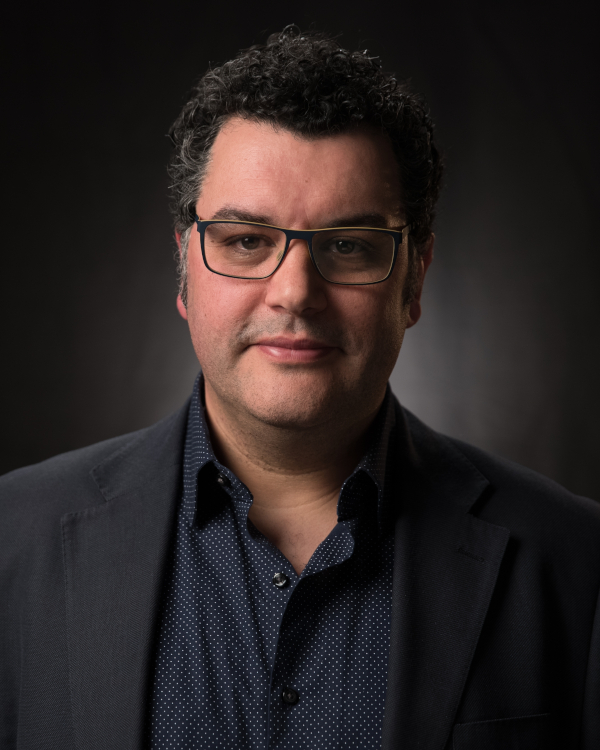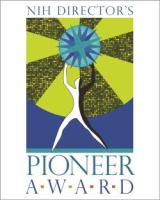2021 Awardees

Polina Anikeeva, Ph.D.
Massachusetts Institute of Technology
Project Title: Fusion of Nanomagnetic and Viral Tools to Interrogate Brain-Body Circuits
Grant ID: DP1-AT011991-01
Funded by the National Center for Complementary and Integrative Health & Common Fund
Polina Anikeeva is a Professor of Materials Science and Engineering and Brain and Cognitive Sciences at the Massachusetts Institute of Technology (MIT). She serves as the Associate Director of the Research Laboratory of Electronics and is an Associate Member of the McGovern Institute for Brain Research. She received her bachelor’s degree in Physics from St. Petersburg State Polytechnic University and a doctoral degree in Materials Science and Engineering from MIT. She pursued postdoctoral studies in Neuroscience and Bioengineering at Stanford, working with Karl Deisseroth. Anikeeva’s research focuses on creating optoelectronic and magnetic materials and devices to study and modulate neural circuits. Drawing inspiration from biology, her group uses a first-principles approach to create neural interfaces from atoms up, with the goal of using them to understand cellular and molecular underpinnings of behavior.

Patricia L. Clark, Ph.D.
University of Notre Dame
Project Title: Decoding the Regulation of Protein Folding by Synonymous Codon Usage
Grant ID: DP1-GM146256-01
Patricia L. Clark is the John Cardinal O’Hara, C.S.C., Professor of Chemistry & Biochemistry and concurrent Professor of Chemical and Biomolecular Engineering at the University of Notre Dame, where she also serves as Associate Vice President for Research. Clark received a B.S. in chemistry from Georgia Institute of Technology and a Ph.D. in molecular biophysics from the University of Texas Southwestern Medical Center and was an NIH NRSA postdoctoral fellow at Massachusetts Institute of Technology. Her laboratory uses a broad range of biophysical, genetic and other tools to investigate how proteins fold correctly and avoid misfolding and degradation by cellular proteases. She is a recipient of the Biophysical Society’s Michael and Kate Bárány Award, a CAREER award from the National Science Foundation, a Medical Research Award from the W.M. Keck Foundation, and has twice received Notre Dame’s Rev. Edmund P. Joyce, C.S.C., Award for Excellence in Undergraduate Teaching. Clark has used opportunities including her Kavli Frontiers of Science lecture on protein foldinghttps://vimeo.com/79963056 -- given to a diverse audience of scientists, engineers and artists – to increasing public understanding of what basic scientists do, how they do it and why it is important.

Rui M. Costa, D.V.M., Ph.D.
Columbia University
Project Title: Brain Control of Internal Organ Function
Grant ID: DP1-AT011979-01
Funded by the National Center for Complementary and Integrative Health & Common Fund
Rui Costa is a Professor of Neuroscience and Neurology at Columbia University, and leads the Zuckerman Mind Brain and Behavior Institute. His laboratory uses and develops genetic, electrophysiological, optical, and behavioral approaches to investigate the neurobiology of action in health and disease. The discoveries of his team produced new models of how basal ganglia circuits interact with other circuits to modulate movement initiation/termination, and organize and refine movement. However, adaptive control of behavior requires not only brain control of movement, but also descending control of organism physiology and internal organ function. Consequently, his laboratory is also investigating the neural circuits and principles governing the adaptive control of internal organ function.

Michaela Gack, Ph.D.
Cleveland Clinic
Project Title: Defining the Viral PTMome: Towards the Development of Novel Antiviral Approaches
Grant ID: DP1-AI169444-01
Dr. Gack is the Arthur and Marylin Levitt Endowed Chair and Scientific Director of the Cleveland Clinic Florida Research and Innovation Center. She did her PhD training in virology at Harvard Medical School as part of a collaborative graduate program between Harvard and the Friedrich Alexander University Erlangen-Nuremberg, Germany. Dr. Gack is interested in understanding how the intricate interplay between viruses and the human immune response impacts the outcome of viral infection and disease. Another long-term goal of her research is to determine the mechanisms by which viral pathogens such as coronaviruses, flaviviruses and influenza viruses usurp human enzymes for their efficient replication. Her work has been recognized by several awards including the GE & Science Prize for Young Life Scientists, the Ann Palmenberg Junior Investigator Award from the American Society for Virology, the Merck Irving S. Sigal Memorial Award of the American Society for Microbiology, and the Vilcek Prize for Creative Promise in Biomedical Science.

Michael J. Higley, M.D., Ph.D.
Yale School of Medicine
Project Title: Bridging Cellular and Systems Neuroscience: Synaptic Dynamics Underlying Behavior
Grant ID: DP1-EY033975-01
Dr. Higley attended Cornell University followed by receiving his MD,PhD from the University of Pennsylvania where he worked with Dr. Diego Contreras on neural representations of sensory information. He then carried out postdoctoral studies at Harvard Medical School with Dr. Bernardo Sabatini studying neuromodulation of synaptic transmission. Dr. Higley started his laboratory at Yale in 2010 in the Department of Neuroscience, focusing on the organization and function of neural circuits in the mammalian neocortex. His group combines an array of electrophysiological and imaging approaches to bridge the gaps between molecular, cellular, and systems neuroscience.

Z. Josh Huang, Ph.D.
Duke University School of Medicine
Project Title: RNA-Programmable Cell-Type Targeting, Editing, and Therapy
Grant ID: DP1-MH129954-01
Funded by the National Institute of Mental Health
Josh Huang is a Professor in the Department of Neurobiology at Duke University School of Medicine, and previously was Charles and Marie Robertson Professor of Neuroscience at the Cold Spring Harbor Laboratory. He received his undergraduate degree in Biology at FuDan University in Shanghai, his PhD degree in Molecular Biology with Michael Rosbash at Brandeis University, and his postdoctoral training with Susumu Tonegawa at the Massachusetts Institute of Technology. The overarching theme of Dr. Huang’s research is to understand the general principles of neural circuit organization of cerebral cortex that enable cognitive function through a genetic dissection of its basic elements, the neuronal cell types. He pioneered a systematic genetic approach to cortical circuits in the mouse, and has made major discoveries in the molecular genetic basis of neuronal identity, synapse specificity, and neural plasticity. He was the recipient of a McKnight Scholar Award in Neuroscience, a Pew Scholar Award, and was a Distinguished Investigator of NARSAD-Brain and Behavior Research Foundation.

Coleen T. Murphy, Ph.D.
Princeton University
Project Title: Cracking the Code of Transgenerational Inheritance of Behavior
Grant ID: DP1-AG077430-01
Coleen T. Murphy is a Professor of Genomics and Molecular Biology at Princeton University. She graduated from the University of Houston with a B.S. in Biochemistry & Biophysics, earned her doctorate in Biochemistry at Stanford University, then did her postdoctoral work at UCSF with Dr. Cynthia Kenyon, where she identified the set of genes downstream of the insulin signaling/FOXO longevity pathway. In her lab at Princeton, Dr. Murphy’s team has developed C. elegans models of human “quality of life” aging phenotypes, including cognitive aging and reproductive aging, and identified remarkably well-conserved genetic pathways that can extend each of these processes with age. Most recently, Dr. Murphy’s team made the surprising discoveries that C. elegans can “read” the small RNAs that bacteria produce and use the information to avoid pathogens, and transmit this learned information both vertically (transgenerationally) and horizontally (to neighboring animals) via a retrotransposon’s viral-like particles. These results have opened up new avenues of research into memory transfer, transgenerational inheritance, and small-RNA-mediated trans-kingdom communication.

Jennifer E. Phillips-Cremins, Ph.D.
University of Pennsylvania
Project Title: From 3D Genomes to Neural Connectomes: Higher-Order Chromatin Mechanisms Encoding Long-Term Memory
Grant ID: DP1-MH129957-01
Funded by the National Institute of Mental Health
Jennifer Phillips-Cremins, Ph.D. is an Associate Professor and Deans' Faculty Fellow in Engineering and Medicine at the University of Pennsylvania with primary appointments in the Departments of Bioengineering and Genetics. Dr. Cremins obtained her Ph.D. in Biomedical Engineering from the Georgia Institute of Technology in the laboratory of Andres Garcia. She then conducted a multi-disciplinary postdoc in the laboratories of Job Dekker and Victor Corces. Dr. Cremins now runs the Chromatin Architecture and Systems Neurobiology laboratory at UPenn. Her primary research interests lie in understanding the long-range chromatin architecture mechanisms that govern neural specification and synaptic plasticity in healthy neurons and how these epigenetic mechanisms go awry in neurodevelopmental and neurodegenerative diseases. She has been selected as a 2014 New York Stem Cell Foundation Robertson Investigator, a 2015 Albert P. Sloan Foundation Fellow, a 2016 and 2018 Kavli Frontiers of Science Fellow, 2015 NIH Director's New Innovator Awardee, 2020 NSF CAREER Awardee, and a 2020 CZI Neurodegenerative Disease Pairs Awardee.

Linda J. Richards, A.O., F.A.A., F.A.H.M.S., Ph.D.
Washington University in St Louis
Project Title: Emergence of Activity Patterns in the Cerebral Cortex and Their Influence on Brain Circuit Development and Function
Grant ID: DP1-NS127279-01
Professor Richards completed her PhD at the Walter and Eliza Hall Institute of Medical Research and postdoctoral training at the Salk Institute for Biological Studies. She started her independent research career in 1997 at the University of Maryland Medical School, Baltimore in the Department of Anatomy and Neurobiology. In 2005 she moved her laboratory to The University of Queensland, Queensland Brain Institute and was also Deputy Director (Research) from 2015-2020. In 2021 she moved to Washington University in St Louis Medical School as Head of the Department of Neuroscience and Director of the McDonnell Center for Cellular and Molecular Neurobiology. Professor Richards was formerly President of the Australasian Neuroscience Society, co-Chair of the Australian Brain Alliance and a founding strategy committee member of the International Brain Initiative.

Mikhail G. Shapiro, Ph.D.
California Institute of Technology
Project Title: Sonogenetic Remote Control of Cellular Function
Grant ID: DP1-EB033154-01
Mikhail Shapiro is a Professor of Chemical Engineering and Director of the Center for Molecular and Cellular Medicine at Caltech. His laboratory develops technologies to enable the imaging and control of cellular function deep inside the body to enable basic biological research and the development of cell-based diagnostics and therapeutics. These technologies combine biomolecular and cellular engineering with the physics of ultrasound and magnetic fields. Mikhail received his PhD in Biological Engineering from MIT, his BSc in Neuroscience from Brown, and was a postdoctoral fellow at the University of Chicago and a Miller Fellow at the University of California, Berkeley.



